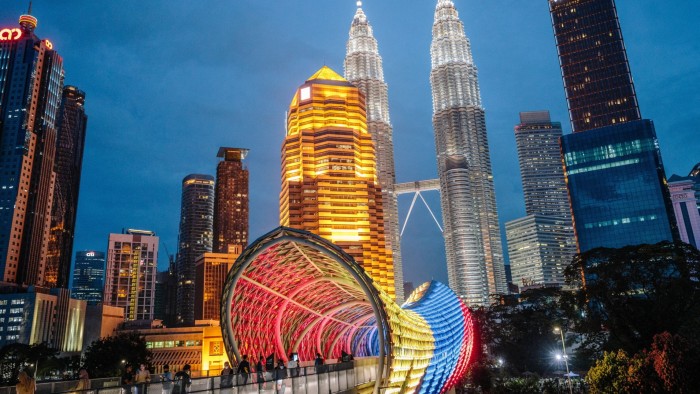Unlock the Editor’s Digest for free
Roula Khalaf, Editor of the FT, selects her favourite stories in this weekly newsletter.
Global tech companies should expect to pay a premium for access to energy and water to serve data centres in Malaysia, the country’s environment minister has said, as booming demand for artificial intelligence infrastructure puts pressure on resources.
Malaysia has emerged as a global hotspot for data centres, the storage facilities that enable fast-growing technologies such as artificial intelligence, cloud computing and cryptocurrency mining.
The country has attracted more than $16bn in investment commitments over the past year from Amazon, Nvidia, Google, Microsoft and TikTok owner ByteDance, most of it for data centre development in the southern state of Johor, which borders Singapore.
But data centres require huge amounts of energy and water to prevent them overheating, which has raised concerns among environmentalists and as well as Malaysian officials.
Nik Nazmi Nik Ahmad, Malaysia’s minister of natural resources and environmental sustainability, said the government was becoming “more selective” after the recent “huge boom” in data centres had put “a lot of pressure” on the country’s water and energy resources.
“We don’t want just any data centre, but if it’s coming with AI or some other technology that’s a bit more cutting edge, then, we will consider them,” he told the Financial Times.
But he added: “Data is the new oil of the 21st century, so we want to be part of that.”
Malaysia, and Johor in particular, has emerged as a data centre hub in recent years thanks to an abundance of cheap land and labour and its proximity to Singapore.
Nazmi said he expected data centres to pay a premium for access to water and energy supplies, adding that many were willing to do so to operate in the country. Malaysia has also drawn investment thanks to a moratorium in Singapore on new data facilities between 2019 and 2022 over concerns about energy consumption.
Malaysia in 2024 began permitting data centre operators to draw energy directly from green power producers, bypassing the grid. Nazmi said the change would support the development of the country’s renewable energy system, as tech companies paid for access to a reliable supply of clean power.
“Because these data centres are willing to pay a premium, they can push the boundaries with regards to renewable energy [and] water recycling in matters that not just general consumers but even normal industries might not be able to because they are not able to absorb the costs.”
There are 22 data centres in Johor, with a further eight under construction, according to research provider Baxtel. Malaysia said earlier in 2024 that there were more than 30 projects at various stages of planning in Johor, though there have been a handful of additional announcements since.
“The potential for data centres in Johor is huge,” said Bryan Tan, a partner specialising in tech at law firm Reed Smith, who added that it currently had capacity for as many as 40 facilities.
Johor is aiming to more than double its energy capacity to 2.7 gigawatts by 2027, which could support as many as 90 data centres, Tan said. But he added this could be achieved only by generating more clean energy.
In response to global concerns about energy usage, big tech companies are increasingly buying power directly from providers or developing their own, backing both traditional renewables such as wind and solar as well as nuclear power.
Malaysia is targeting 70 per cent renewable energy capacity by 2050, up from 25 per cent at present, Nazmi said, with the government examining options including solar and pumped hydro storage.
The country has also revised its water tariffs in recent years and was reconsidering energy subsidies as part of efforts to ensure the biggest corporations were paying full price, he added.


